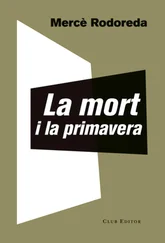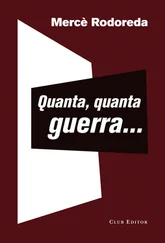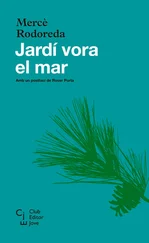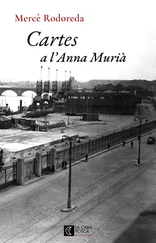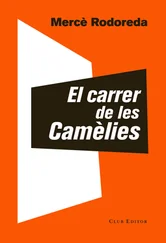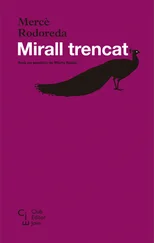Finally one afternoon Mercè managed to open one of the bottles. They each took a swallow, then closed it again. When they left, their hearts were beating, and when they returned the next day, their hearts were pounding. Every afternoon they opened a bottle, but they took only one swallow. One hot day, her grandfather wanted a cool drink and went to look for a gasosa. He found them all open, all flat. “This granddaughter of mine!”
The doll was completely forgotten. Mercè played at Senyora Borràs’s house: she would polish the faucets and helped dry the dishes. She would visit Senyora Domingueta, a tall thin widow with tiny, sunken eyes. She was rather dismal looking in her black silk dress, and she spoke slowly, in a low voice, her eyes never moving. Mercè painted the pigeon coop for her. Felipet held the bucket of dark blue paint while the pigeons cooed on the rail and the swallows that nested in the gallery flew back and forth, warbling uneasily. One day she stole a chrysanthemum from Senyora Borràs’s garden. It was egg-yolk yellow, large and ruffled like a complicated piece of gold jewelry. She spent an entire morning walking up and down by the clump of flowers, stealing a look at it from the corner of her eye. She snatched it at noon, placed it on her chest, under her apron, and raced into the house panting, her face waxen, the flower crumpled, ugly, dulled.
•
One gray day when they didn’t know what to play, they decided to bathe the doll. At the end of the vegetable garden, leaning against the trunk of a mandarin orange tree, stood a zinc tub, old and dented, with some rainwater in the bottom. A few dry, decayed leaves were floating in it.
“First, we’ll put her in the water to soften her,” said Mercè.
They undressed her. Her slip was pinned to her back with two tiny nails. Felipet went to the kitchen to look for a knife to pry them out.
They placed her in the tub in all her rosy nakedness, the water up to her neck, her innocent blue eyes half closed beneath the long eyelashes.
“Hands and feet are always the dirtiest. Especially children’s, and dolls are children’s children,” Mercè said when Felipet told her with a frown that dolls shouldn’t be bathed.
“What are you doing?” shouted Mercè’s mother from the kitchen. It made them jump.
“We’re playing!” Mercè called loudly.
“We’re playing,” echoed Felipet.
“You’re awfully quiet. Are you sure you’re not up to something?”
All you could see were eyes that day. Both children had their hair cut in bobs, their bangs framing their faces like horseshoes.
“Come inside, it’s time for your snack.”
•
They didn’t remember the doll until the following day.
There had been a torrential downpour during the night. The rain coursed through the gully nearby, leaving the two gardens filled with golden leaves. The pointed, shiny Chinese tomatoes — dull red, in clusters of seven — were swaying in the wind, filling the air with a sickly, sour smell. The leaves on the pomegranate tree were bright yellow, the sky limpid.
They found the doll soaked with water. They were distressed to see her delicate pink skin was chipped. The dark gray cardboard oozed out like a purulent sore. Only the porcelain face remained intact, indifferent, lips parted with a smile, cheeks rosy.
When Mercè picked up the doll, her wig fell off.
“Bald.”
“Like a melon,” Felipet said in dismay, yet unable to keep from smiling.
That was the only thing they said about the tragedy.
Toward the end of the afternoon, while Mercè’s mother was shopping, the two children brought the doll inside, feeling as if they were going to a funeral.
“Let’s hide her under the bed.”
“Maybe we should keep the head and throw the rest away.” Felipet said. As soon as he had spoken, his eyes filled with tears.
•
When Mercè got into bed at night, she would start thinking about the doll. She had cared very little about her before, but now she couldn’t live without her. She waited until the house was silent and everyone asleep. Then she would turn on the light and curl up by the edge of the bed. “She’s dead,” she would murmur as she stroked her cheek, a sad expression on her face.
“What are you doing with the light on for so long?” her mother called to her one night from her room next door.
“Pee pee.”
She jumped into bed and turned off the light, trembling.
During the day, Felipet visited the doll. Mercè would take him to see her. In the midst of some lively game, or while reading a story, the memory of the doll would rush feverishly over her, and she would hurry to look at her, pulling her by the arm or leg, gazing silently at the distorted cardboard shape.
Till the day the doll was discovered and the elders created a row.
. . no, no, just like I was telling you, I ain’t never been able to sleep on the train, I get kinda drowsy, but I always hear the creaking of wheels and wood and besides, with all this wobbling and jerking, I’m afraid to go to the toilet and it frightens me that the train might send me spinning against the wall and me struck dumb and if nobody has a need for hours, even if I holler nobody’s gonna hear me and at my age they’d find me dead and I don’t want to die without the taking of Our Lord. All of us could be struck by accident, but it’d be mighty sad to die doomed and me, I don’t like fire, and the one in hell, judging by what they say, must be one of the fiercest.
They thirsty? Poor creatures, sure they’re thirsty. With these half-open beaks, their crests all sad — but I can’t help ’em any. The day after tomorrow they’ll be dead and roasted ’cause it’s Santa Maria and at my gentleman’s house they gonna have them a big party ’cause, besides being the Senyora’s Saint’s Day, the oldest daughter, she looks like a Virgin on one of them religious cards, well she’s gonna make her debut. You gonna remember to let me know when we get to Barcelona? I can’t read, not one letter, my son now he knew how to read like he was a gentleman’s son, but he died from the chest and he wasn’t even twenty years old. My husband, he told me: “Don’t cry, now he don’t have to be a soldier.” ’cause we used to live right in Barcelona, I don’t remember the name of the street now, but it was near the Estació de França. My husband was a baker and they liked him, and working with flour ain’t something disgusting. I used to always tell him — Virgin Mary, and now it has to rain and these poor little creatures must be dying of thirst, with this sultry weather, look at them nice and fat, that’s how I raise ’em, no lice, co-coc, co-coc , poor little things, if I could only collect a bit of water for ’em. You see, they used to run free all day. And I always try to keep their feet all dry and. .
I think it was the year they burned the convents, no? I hope the good Lord don’t remember them, and in the village there was a storm that destroyed all the crops and left us poor as Job’s turkey and my husband said to me: “Let’s go to Barcelona, that way the boy’ll learn more than if we stay here, a farmer’s always a farmer, but a gentleman is always a gentleman.” And my brother, who had money ’cause he was the oldest and got everything, he had it good, good since the day he was born, well he bought the house and the fields so as to raise the value of his property, ’cause he could and we couldn’t, and when we got to Barcelona we had a little money, but bit by bit we lost it all, ’cause my husband couldn’t find work straight off and the boy was already sickly, and doctor here doctor there till good-bye to the money my brother gave us for the house and the land. And all on account of the water, ’cause without that spell of bad weather, what must of been punishment for burning Barcelona, and the good always pay for the sinners and we had to pay ’cause the land was by the river and on a slope and the water carried everything away.
Читать дальше






